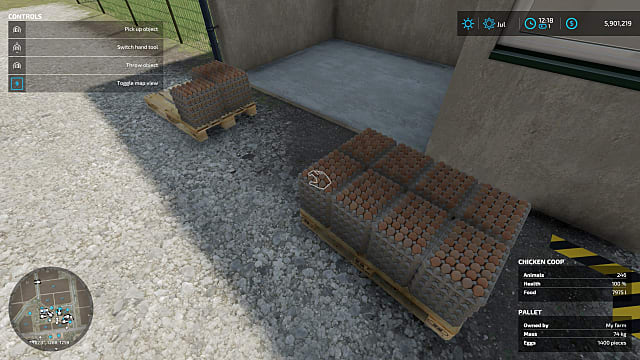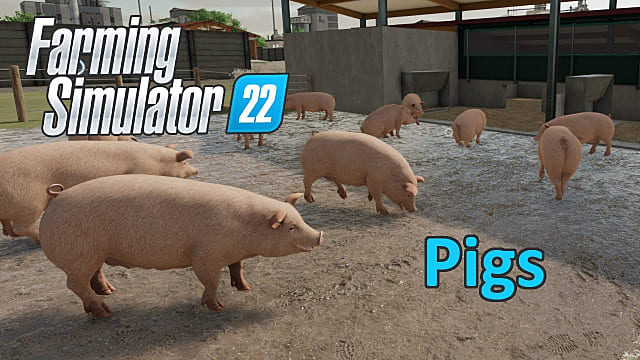Much like the previous versions of the Farming Sim franchise, Farming Simulator 22 includes both arable farming and the ability to raise a number of different animals as a means of earning money. With cows, pigs, sheep, chickens, horses, and bees to choose from, animal husbandry can be a bit daunting.
In this Farming Simulator 22 animal husbandry guide, we’re going to talk about animals and the role they play in your million-dollar farming empire. We’ll list the animals below from most passive to the most labor-intensive so you can prioritize which to add to your farm. Some require more attention than others, but not all reward that time spent the same.
Animal Husbandry in Farming Simulator 22
The Bees and the Bees

One of the quickest, cheapest options to start with is bees. Bees are one of the new animals in Farming Simulator 22 and are one of the best passive forms of income, with a few caveats.
With bees, you only need to place them and provide a point for their honey to be sent to. From there, honey will be transported and either sold or used in a greater capacity via the production chain.
With that said, you can raise bees for as little as $1,300, though I would suggest “going big” with these animals and choosing the largest beehive that costs $19,000 and yields, on normal difficulty at least, generally a pallet of honey per day.
Aside from being a cheap form of income, bees also confer a small crop yield bonus to potatoes, canola, and sunflowers if planted close to those fields. It is worth noting that you may only have one honey collection point, so make sure to have it in a frequented spot to keep up with production.
Honey from these animals can either be sold as-is or used in the production of cereal if you own the correct facility for it.
Chicken(s) Little

Chickens are the second most passive income source when it comes to animals in Farming Simulator 22, and raising chickens is a great way to really rake in the cash early on in your career.
Chickens are cheap animals. They cost $5 each, plus a delivery fee if you don’t have your own trailer in which to haul livestock. There are two available choices for chicken pens for the chickens: a relatively cheap pasture for $6,000 that can hold 30 chickens or the $79,000 USD chicken coop that can house 360 chickens.
The best bang for your buck here is to go for the bigger chicken coop. First, pastures for all animals are more work because they require water, which you’ll have to bring to them. Coops and barns automatically refill water for your animals.
Second, buy a rooster to fertilize the eggs — I would recommend one per every 10 hens. Having more chickens is a better long-term strategy than selling eggs in the short term. I started my coop with 6 roosters and 60 hens, and after my second year, my chicken population was at 246 without buying any more chickens.
Chickens can eat wheat, barley, and sorghum, which are all bountiful crops. However, choose sorghum as your feed crop since it can be used for chickens and horses.
Dreaming of Fabric Sheep

Sheep themselves are an OK source of income. They are the last group of animals that I would deem passive. With a sheep barn, your only concern is supplying grass or hay to keep them fed and happy.
Sheep can come in at a steeper price of $97,000 USD for the best barn capable of housing 25 sheep, but they are animals well worth the investment for their bi-product: wool.
Wool from these animals is a good seller as-is, averaging between $1,000-$1,300 per 1m3, putting a full pallet at about $4,000. But the real money is in turning wool into fabric at a spinnery, which more than doubles the sale price.
Until the Cows Come Home

Cows are one of the most iconic farm animals, so you may want to start here when adding animals to your farm, but they require more work than bees, chickens, and sheep in Farming Simulator 22.
To be happy and productive, cows need a mix of food known as Total Mixed Ration. TMR is made up of grass, hay, and silage, which you’ll have to make yourself unless you buy the automated barn for $722,500 USD. It does, however, have an automated feeding robot that takes care of the animals for you. Still, you’ll need to provide the grass, hay, and silage, which takes time and effort.
Cows are animals that will also produce slurry, which can be used as a liquid fertilizer for your fields. If you add straw to the barn, they’ll make manure instead, which can also be used as fertilizer or sold to the biogas plant to earn a bit more money.
Hold Your Horses

Horses are planted firmly in the active animals list but are a bit more low maintenance than cows when it comes to materials needed to raise them. For horses, you’ll need straw for bedding, oats/sorghum, and hay for feeding, and if you choose a barn over a pen (which is highly recommended), you don’t have to worry about water.
Horses are not so much resource intensive as they are time intensive animals.
There are no bi-products to sell from horses. Instead, horses are animals that require your time in the form of training, which increases their value. You’ll need to ride them daily and keep them well-groomed in order to build their health and fitness and increase their value.
You can buy a horse for $500 USD and after seven months of feeding, riding, and grooming, sell them for roughly $1,300 USD, which isn’t a bad profit. I’ve tested all of the different breeds of horses, and there’s no monetary difference between the animals.
Pigs in the Mud

Pigs are the most resource-intensive animals available in the base game. Pigs require a good mix of crops in order to fulfill their food requirements, with the following crops listed from most effective to least effective:
- Corn/Sorghum — 50%
- Wheat/Barley — 25%
- Soybeans/Canola/Sunflower — 20%
- Potatoes/Sugarbeets — 5%
While you don’t necessarily have to feed these animals all of the crops above, you won’t maximize your profits otherwise.
To get around growing all of those crops, supply pigs with pig food from the store. It’s not the most cost-effective choice, though, as each 1,000L food pallet costs $1,000.
Pigs are animals that will make slurry as a bi-product but not manure (even if you add straw to the barn, which is required as bedding material). However, they must be in the barn to do so; it cannot be produced in pig pastures, making barns a better option for making more money.
Like horses and some cows, you make money by breeding and selling pigs. There’s no price difference between breeds — only cosmetic — and if all of their needs are met, pigs will generally reproduce every 4-5 months once they hit the appropriate age.
To maximize profits with these animals, invest in an animal trailer to haul your pigs (and horses/cows) to the animal seller yourself to avoid paying the transportation fees.
And that about covers the basics of animal husbandry and tending to animals in Farming Simulator 22. Animals can be a fun and profitable addition to your farm, as well as something to occupy your time between planting and harvesting crops. They’re also a great way to make more money in the winter months when farming isn’t an option.







Published: Nov 30, 2021 01:33 pm